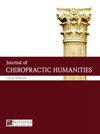脊医的身份、角色和未来:对南非脊医调查的二次分析
Q3 Health Professions
引用次数: 0
摘要
目的:本次要数据分析的目的是评估南非脊医对职业身份、角色和未来相关概念的看法。方法采用横断面定量二次分析方法,邀请南非脊医(n=909)参加修改后的匿名在线调查。进行频率分析、描述性分析、信度分析和相关性分析。结果有效率为18.7% (n=170)。大多数受访者年龄在25-34岁之间(48.8%),女性(61.2%),在豪登省执业(44.1%),约翰内斯堡大学毕业生(47.6%)。大多数完成了循证实践课程(71.2%),临床经验不足5年(40%)。受访者同意(94.1%)脊医应该接受循证实践教育。大多数受访者认为捏脊疗法在诊断(54.7%)和使用脊柱推拿和其他方式治疗脊柱疾病(70%)中的作用。受访者中有超过50%的人同意统一身份,关注健康,健康和预防保健,为该职业的未来。在身份、实践范围(角色)和脊椎指压疗法的未来之间发现了正相关。结论:南非的脊椎指压师样本认为,脊椎指压师是使用循证实践的脊柱保健提供者,该职业的未来应该包括促进整体健康和患者健康。本文章由计算机程序翻译,如有差异,请以英文原文为准。
Chiropractic identity, role, and future: A secondary analysis of a survey of South African chiropractors
Objectives
The purpose of this secondary data analysis was to evaluate perceptions of South African chiropractors on concepts related to the identity, role, and future of the profession.
Methods
A cross-sectional quantitative secondary analysis was conducted by inviting South African chiropractors (n=909) to participate in a modified anonymous online survey. Frequency, descriptive, reliability and correlational analyses were performed.
Results
An 18.7% response rate was achieved (n=170). Most respondents were aged 25-34 (48.8%), female (61.2%), practicing in Gauteng (44.1%), and graduates of the University of Johannesburg (47.6%). The majority completed a course in evidence-based practice (71.2%) and had less than 5 years of clinical experience (40%). Respondents agreed (94,1%) that chiropractors should be educated in evidence-based practice. A majority of respondents perceived the role of chiropractic in the diagnosis (54.7%) and treatment (70%) of spinal conditions using spinal manipulation and other modalities. There was over 50% agreement among respondents for a unified identity focusing on wellness, health, and preventative care for the future of the profession. Positive correlations were found between the identity, the scope of practice (role), and the future of chiropractic.
Conclusion
This sample of South African chiropractors perceived chiropractic practitioners to be spinal healthcare providers who use evidence-based practices, and that the future of the profession should include promoting overall health and patient wellness.
求助全文
通过发布文献求助,成功后即可免费获取论文全文。
去求助
来源期刊

Journal of Chiropractic Humanities
Medicine-Complementary and Alternative Medicine
CiteScore
1.70
自引率
0.00%
发文量
7
 求助内容:
求助内容: 应助结果提醒方式:
应助结果提醒方式:


